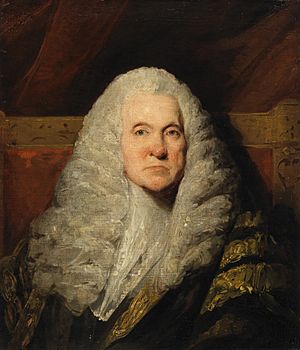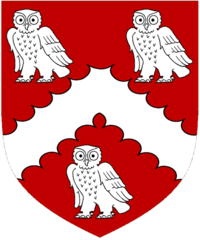James Hewitt, 1st Viscount Lifford facts for kids
Quick facts for kids
The Viscount Lifford
PC (Ire)
|
|
|---|---|

Lord Lifford.
|
|
| Lord Chancellor of Ireland | |
| In office 24 November 1767 – 28 April 1789 |
|
| Monarch | George III |
| Preceded by | The Lord Bowes |
| Succeeded by | John FitzGibbon |
| Member of Parliament for Coventry |
|
| In office 1761–1766 Serving with Hon. Andrew Archer
|
|
| Preceded by | William Grove Samuel Greatheed |
| Succeeded by | Hon. Henry Seymour-Conway Hon. Andrew Archer |
| Personal details | |
| Born | 1712 |
| Died | 1789 (aged 77) |
| Spouses | Mary Rhys Williams (m.1749, d.1765) Ambrosia Bayley (m.1766, d.1807) |
| Profession | Lawyer, Politician |
James Hewitt, 1st Viscount Lifford (born April 28, 1712 – died April 28, 1789) was an important politician, lawyer, and judge from Ireland. He held a very high position called the Lord Chancellor of Ireland for many years, from 1767 until he passed away in 1789.
Contents
Early Life and Family Background
James Hewitt came from a humble background. His father, William Hewitt, was a cloth seller (draper) in Coventry, England. His mother was Hannah Lewis.
In those times, where you came from mattered a lot. James's simple background was sometimes a challenge for him. People even made unkind comments about his "small-town" manners.
Even so, James Hewitt used his influence to help his brother, William. He helped him get a job selling land in the British West Indies.
Hewitt's Career Journey
James Hewitt started his career working as a clerk for a lawyer. By 1742, he had become a barrister, which is a type of lawyer who argues cases in court.
He quickly moved up in the legal world. His career reached its highest point when he was made the Lord Chancellor of Ireland in 1767. This was a very powerful legal position, and he held it until his death in 1789.
In 1768, he was given the title Baron Lifford. This made him a member of the Peerage of Ireland, a special group of noble people. Later, in 1781, he received an even higher honor, becoming Viscount Lifford.
Time as a Member of Parliament
Before becoming a judge, James Hewitt was also a Member of Parliament (MP). He represented the area of Coventry in the British Parliament from 1761 to 1766.
However, he wasn't known as a great speaker in Parliament. Other MPs sometimes complained that his speeches were hard to hear.
His Reputation as a Judge
Before he became the Lord Chancellor of Ireland, many people thought James Hewitt was just an ordinary lawyer. They saw him as "dull" and not very smart, and he was aware of his humble beginnings.
Even the government that chose him for the job had doubts. While they said he was a good lawyer and honest, they weren't sure if he was strong enough to be an effective Lord Chancellor. Some English judges even made fun of his appointment.
Proving Doubters Wrong
But James Hewitt quickly proved everyone wrong. Within two years of arriving in Ireland, he was praised as an excellent judge.
John Hely-Hutchinson, a colleague in the Irish Government, wrote about him. He said that Hewitt did his work very well and quickly. He was popular and respected by lawyers and people who used the courts. Hely-Hutchinson called him a "worthy, honest, amiable man."
Hewitt was so good at his job that almost all legal cases about fairness (called equity) were sent to his court. This was partly because another court, the Court of Exchequer, was known for being very slow.
Lawyers who worked in his court, like John Philpot Curran, remembered him fondly after he died. They even used "the great Lord Lifford" as an example for other judges to follow.
Lord Lifford's Family Life
Lord Lifford was married twice. His first wife was Mary Rhys Williams. They married in 1749 and had four sons together. These included James, who would become his heir, and Joseph, who also became a judge. Mary passed away in 1765.
In 1766, he married his second wife, Ambrosia Bayley. She was much younger and known for her beauty in Ireland. With Ambrosia, he had another son and two daughters.
His eldest son, James Hewitt, 2nd Viscount Lifford, took over his title after his death. Lord Lifford lived at Belvedere House in Drumcondra. Ambrosia passed away in 1807.
Coat of Arms
|
 | William Lucy |
 | Charles Hayes |
 | Cleveland Robinson |



